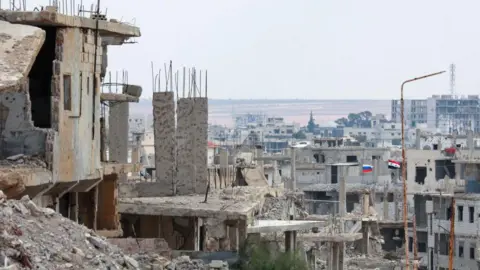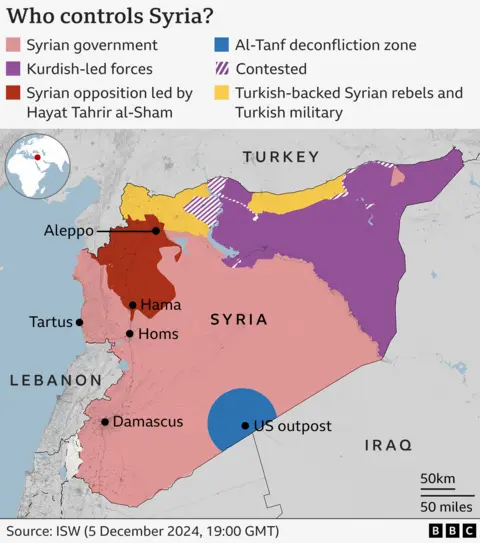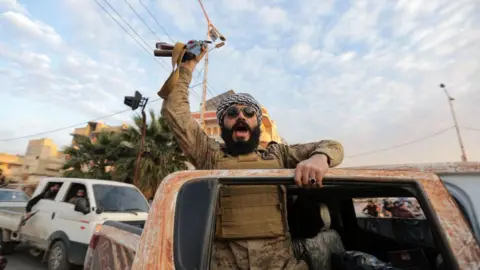Local rebels take over a large part of Deraa province in southern Syria

 AFP
AFPRebel forces in southern Syria have reportedly captured most of Deraa province – the birthplace of President Bashar al-Assad’s 2011 uprising.
A UK-based war monitor reports that “local gangs” were able to take control of several military bases following “violent clashes” with government forces.
According to the Reuters news agency, rebel sources say they have reached an agreement for the army to withdraw and for army officers to be given safe passage to the capital, Damascus – about 100km (62 miles) away.
The BBC could not independently confirm the reports, which come as Islamist-led rebels in northern Syria say they have reached the outskirts of the city of Homs.
The Syrian Observatory for Human Rights (SOHR), a UK-based war monitor, said on Friday that rebels in the south control more than 90% of Deraa district and that only Sanamayn district is in government hands.
The city of Deraa has strategic and symbolic importance. It is the provincial capital and close to the Jordanian border crossings, and it was also the site of pro-democracy protests in 2011 – sparking the country’s ongoing civil war, in which more than half a million people have been killed.
Jordan’s interior minister said the country had closed its side of the border “due to the security situation surrounding southern Syria”.
Meanwhile, government officials in the town of Suweida – 50 kilometers east of Deraa – are reported to have fled the town following clashes between security forces and militias from the Druze minority, which is the dominant group in the region.
Ryan Marouf, an activist and editor of the news website Suwayda 24, told Reuters that “people see what is happening all over Syria as the liberation of Syria and an opportunity to topple the regime”.
Elsewhere, Kurdish-led forces said they had captured the city of Deir Ezzor, a major government stronghold in the country’s eastern desert.
It has been more than a week since northern rebels launched their biggest campaign against the Syrian government in years, which has exposed the weakness of the country’s military.
At least 370,000 people are thought to have been displaced so far by the rebels, according to the UN, which says the fighting is “exacerbating an already dire situation for civilians in the north of the country”.
Some residents are trapped in frontline areas unable to reach safe areas.
SOHR says more than 820 people, including 111 civilians, have been killed across the country since Islamist-led rebels launched an offensive last week.
See seized Hama, north of Homs, on Thursday – the second major blow to President Assad, who lost control of Aleppo last week.
The leader of the Islamic terrorist group Hayat Tahrir al-Sham (HTS), Abu Mohammed al-Jawlani, told the residents of Homs that “your time has come”.
The rebels have been moving south, and Homs would be the next stop on the road to Damascus.

Terrified members of President Assad’s minority Alawite community rushed out of Homs, with video footage showing streets filled with cars.
“Our forces liberated the last village on the outskirts of the city of Homs and are now within its walls,” the Syrian group leading the offensive said on Telegram.
The BBC could not confirm this movement, but SOHR reported earlier that the rebels were within a few kilometers of the city.
SOHR said Russian warplanes bombed the nearby Rastan bridge in an attempt to slow the movement of rebels.
After the Syrian army lost control of Hama following several days of fighting, it is unclear whether they will be able to secure Homs.
The Ministry of Defense has denied claims that it has withdrawn troops from the strategic city, which links the capital Damascus to the Alawite stronghold on the Mediterranean coast.
The Alawites are a Shia Muslim minority from which the Assad family originates.
They have long formed a large base of support for the Assad regime, and are key to the president’s hold on power.
Assad vowed to “crush” the rebels and accused the West of trying to redraw the territory’s map.
But commentators say his power is losing power, they are faced with low wages and corruption in the ranks. He announced a 50% salary increase in recent days, according to state news agency Sana.
Russia and Iran, the regime’s most important allies, have announced continued support for Assad,
But they have never provided the kind of military aid that has so far supported his rule, and Moscow is now urging Russians to leave the country.
The US on Friday also advised its citizens to leave Syria “while trade options are still available in Damascus”.
 Getty Images
Getty ImagesThe Kremlin is preoccupied with its war in Ukraine, and Iran has been weakened by Israel’s punitive campaign against its powerful ally, Lebanon’s Hezbollah.
Hezbollah, whose fighters have been key to the regime’s hold on Syria, are now largely absent from the battlefield, although reports in the Lebanese and Israeli press say small numbers have crossed the border to defend Homs.
Russian and Iranian officials are expected to meet their Turkish counterparts at the weekend to discuss a response to the outbreak of civil war in Syria.
Turkey supports other rebel groups and its president, Recep Tayyip Erdogan, has been pressing Mr Assad for months to reach a political solution with the opposition.
He expressed support for the rebels’ recent advances, saying the attack would not have happened if Assad had answered his calls.
Analysts say it probably wouldn’t have happened without Ankara’s knowledge and consent.
On the other hand, the leader of HTS, Abu Mohammed al-Jawlani, has been speaking publicly to soften his image and reassure both Syrians and foreign leaders.
He has emphasized his separation over the years from the Islamic State and Al Qaeda, portraying himself as opposed to attacks outside Syria, and promising protection for minority communities.
In an interview with CNN, al-Jawlani said the goal of the rebel forces was to overthrow the Assad regime and install a government that represents all Syrians.
Earlier, HTS fighters and their allies took over Hama and freed prisoners from its central prison amid heavy fighting, while the military said it had also sent troops outside the city.
Hama is home to a million people and is 110 kilometers south of Aleppo, which rebels captured last week.
In Aleppo, a city of two million people, some public services and critical institutions – including hospitals, bakeries, power stations, water, internet and communications – are disrupted or not functioning due to lack of supplies and staff.
UN Secretary-General Antonio Guterres called on “all those with influence to do their part” to end the civil war.
With additional reporting by Maia Davies
Source link




